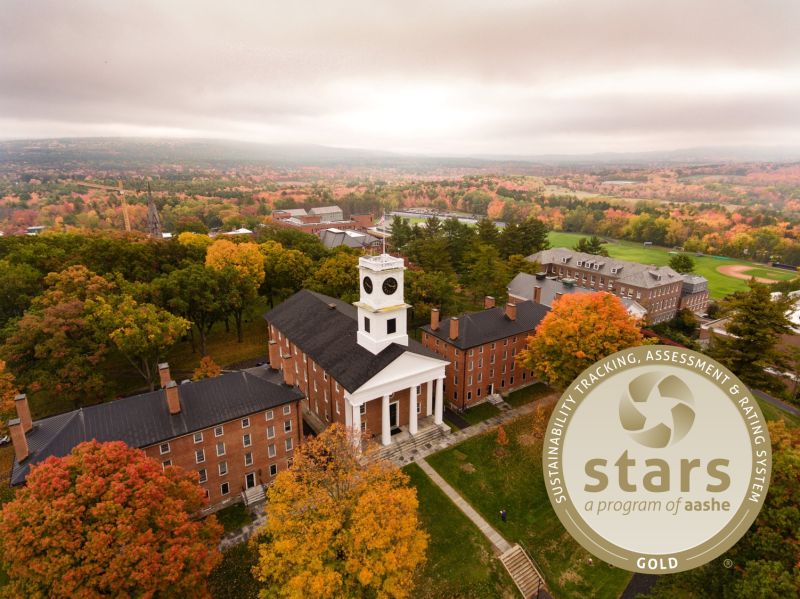Amherst Earns Gold Star in Sustainability
The Office of Sustainability announced that the college has achieved a Gold rating in AASHE’s STARS program, which focuses on a holistic assessment of campus sustainability practices.

As of this fall, the college has earned a Gold rating from the Association for the Advancement of Sustainability in Higher Education (AASHE)’s Sustainability Tracking, Assessment & Rating System (STARS) program. The 67.18 points accumulated across five categories (academics, engagement, operations, planning and administration, innovation and leadership) in the most recent report indicates a 40% improvement from the college’s previous score of 46.39 in 2019.
Wes Dripps, director of sustainability, explained how STARS’ unique dual emphasis on self-reporting and public transparency creates an honest, “data-driven framework” for colleges to reflect on where they are and compare themselves to other institutions.
All eight NESCAC schools that have submitted the lengthy report required to receive a STARS rating are also in the Gold category. Across the world, only 12 reporting institutions currently have the highest designation of Platinum.
Dripps and the Office of Sustainability’s Green Deans, Anna Hogarth ’23 and Audrey Woods ’24E, worked with two student fellows, Sara Zhu ’24 and Emily Byers ’25, for over six months, collecting data, discussing best practices, and translating their work into the language of STARS’ metrics.
“When I say it takes a campus, it really took a campus. There were … maybe upwards of 100 different stakeholders that contributed to the report,” Dripps said.
The extensive list of criteria considered by STARS forces campuses to look holistically at their sustainability practices. In the publicly accessible report, Amherst has three featured programs: the Campus Energy Transition project, Amherst’s plan to decarbonize by 2030; the Circular Waste System, redistribution of items through the Free Clothing Give Away and Move in Yard Sale; and Amherst’s need-blind admissions policy. The third feature, part of the social equity credit classification on the STARS report, underscores the comprehensiveness of the STARS definition of sustainability, which extends beyond the traditional realm of direct environmental harm mitigation.
Dripps said he agreed with the more capacious definition of sustainability.
“I want to be careful that sustainability doesn’t get tagged as kind of a wealthy person's endeavor, that we want to be very particular about any solution we put forward that [is] economically inclusive to the campus community,” Dripps said.
Amherst’s focus is now on sustaining its sustainability.
“Sustainability isn’t a checklist … a lot of the work now is, how do we continue to sustain the good work that we’ve done over the next three years before we do this again,” Dripps said.
This new score is valid for three years, and Dripps already sees many changes underway that may, hopefully, raise it even higher.
Amherst earned only 33.5% of points possible on “energy and climate,” the second highest-weighted subcategory. Dripps believes the college’s decarbonization project is already on the path to improve the score in the next five years. Dripps also believes Amherst is making strides in improving its food and dining score with the onboarding of new Dining Director Bill Connor. The Office of Sustainability is committed to ongoing discussions of how the college can make more sustainable purchases for campus operations, as the college’s lost points in the overall category were largely a result of its “sustainable procurement system” score.
According to STARS’ website, “STARS is intended to engage and recognize the full spectrum of higher education institutions, from community colleges to research universities.”
While Dripps noted liberal arts colleges are excused from categories relating to the sustainability of graduate programs, all applicable metrics are to be measured by all colleges and universities. Specific priorities and institutional setups are not accounted for. The college lost points in the transportation category for not explicitly encouraging faculty to reduce their air travel, but gained points for the 99.73% of students who use “sustainable commuting options,” certainly aided by the fact that classes are no more than a 10 minute walk apart.
STARS’ intensive reporting methodology prompts integral intra-institutional reflection and charts the course forward to a more holistically sustainable future.
“STARS (is) as much about the journey as the final report, because it forces my office to engage with all the stakeholders. I get to know them personally. It’s about relationship building,” Dripps said. “Sustainability is the greatest team sport there ever was.”





Comments ()